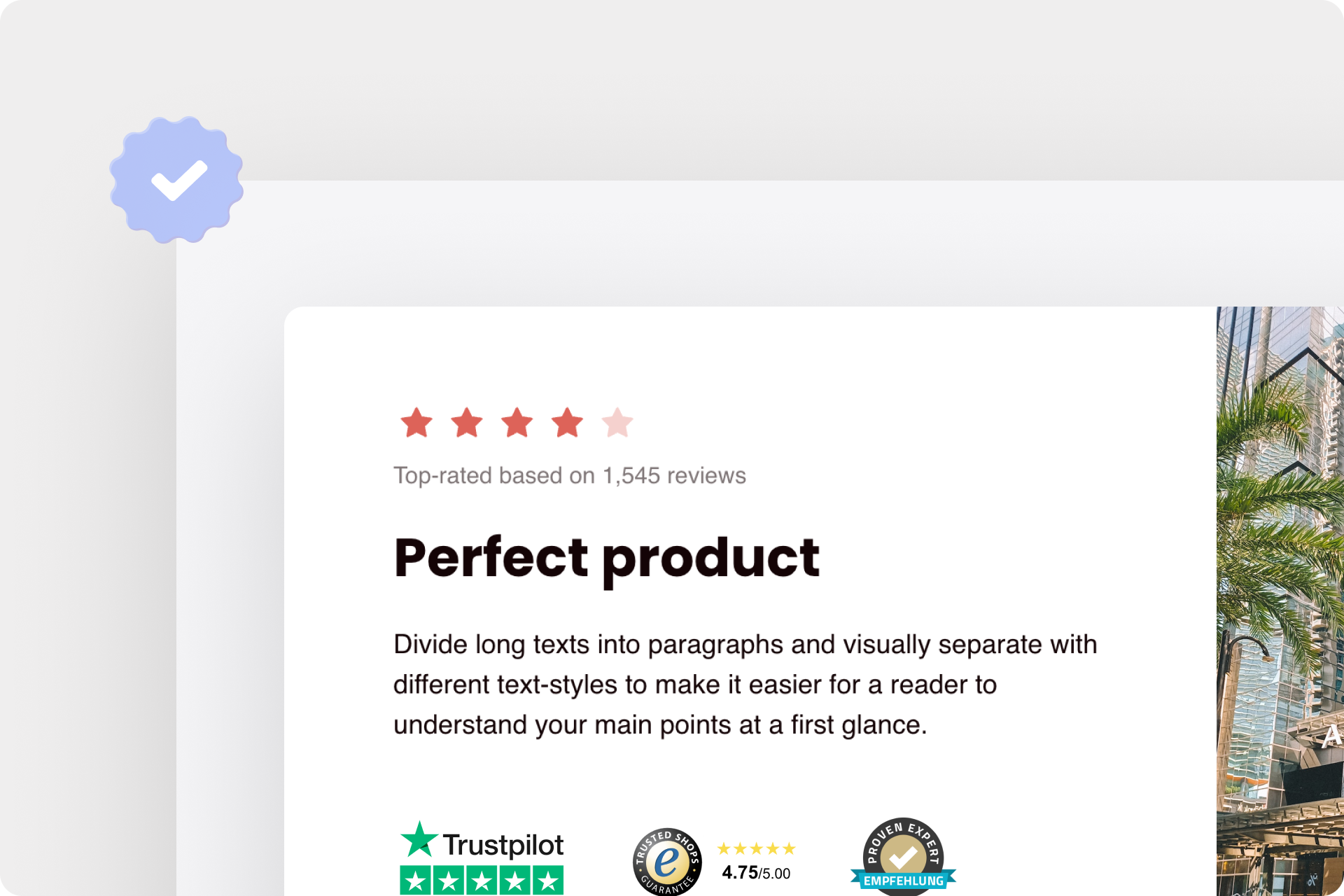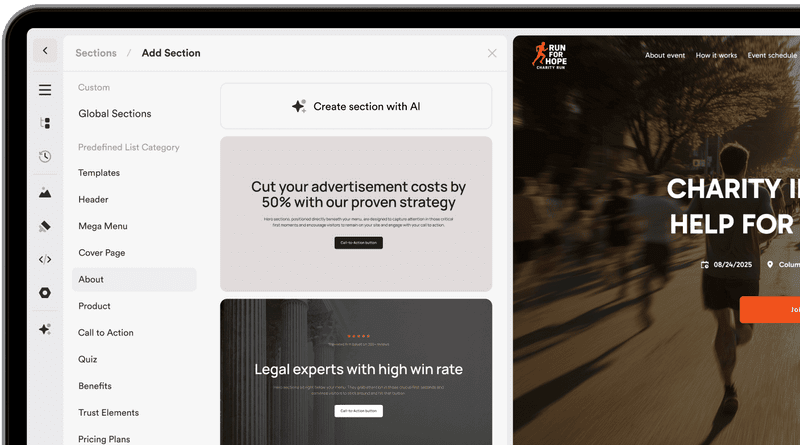August 7, 2023
Starting a small business and building self-employment (checklist)
Successfully start a small business and venture into self-employment

Everyone has experienced them at some point - those moments when thoughts revolve around starting their own business and realizing their self-employment dreams. A flicker of enthusiasm and anticipation arises when imagining what it would be like to establish one's own company and turn dreams into reality. The prospect of independence, the ability to bring creative ideas to life, and transforming one's passions into a thriving business are truly enticing.
However, while the dream of self-employment comes with a dazzling array of possibilities and opportunities, the path to success also presents its challenges and obstacles. The process of starting a small business requires not only commitment and perseverance but also a solid strategy and in-depth knowledge of the fundamental steps that need to be taken.
In this blog article, we will delve into the intricacies of building a small business and the steps necessary to achieve success. We will provide you with valuable tips and advice to help you fulfill your dreams and establish your company on a solid foundation.
From conceiving an innovative business idea to crafting a thoughtful business plan, addressing legal considerations, and creating a strong online presence - we will offer you a guide to navigate the diverse challenges and pave your way to success.
Starting a business: the first steps

Finding the right idea:
The first step in starting a small business is to find an innovative and viable business idea. Make sure your idea is unique and there is demand in the market. Thoroughly analyze the market, identify potential customers, and determine if your idea can provide value.
Here are some questions that can help you find a suitable idea:
- Is there an unmet need or gap in the market that your idea could satisfy?
- How does your idea differentiate itself from existing offerings? What makes it unique?
- Is there a sufficient target audience that might be interested in your product or service?
- What potential advantages or added value does your idea offer compared to the competition?
Create a business plan:
A well-thought-out business plan forms the foundation for building your small business. By setting clear goals, defining your target audience, developing an effective marketing strategy, and making financial projections, you establish the course for your success. However, a solid business plan is not only crucial for you as an entrepreneur but also for potential investors or lenders.
Start by describing your business idea and vision. Define your goals and formulate them in a specific, measurable, and realistic manner. Consider who your target audience is and analyze their needs and preferences. A detailed market analysis will help you understand the competitive landscape and determine how you can position yourself.
Also, consider risk factors and potential challenges that may lie along the way. How will you address them, and what measures can you take to maximize your chances of success? A robust business plan enables you to consider these aspects and be prepared.
Networking and finding mentors:
When building a small business, it's not only important to have expertise in your field but also to seek support and advice from experienced individuals. Utilize your network to find mentors who can guide you along the way. Mentors can offer valuable insights and connections to help you navigate potential obstacles and achieve success faster.
Look within your personal circle for people who have already built successful businesses or possess expertise in your industry. They can share valuable experiences, provide you with valuable advice, and assist you in making important decisions. A mentor can also help you expand your network by connecting you with relevant contacts and potential business partners.
Attend industry events, conferences, or networking gatherings to connect with other entrepreneurs and professionals. Engage with like-minded individuals, make new connections, and be open to collaboration opportunities. A strong network can not only provide you with valuable information and support but also open doors to potential customers or business opportunities.
Exploring financing options:
The question of financing is one of the biggest challenges for many small business owners. However, there are various ways you can finance your business. It's important to carefully examine these options and choose the one that best suits your needs and goals.
One option is to use equity financing. This means investing your own money or assets into your business. This can include personal savings, a payout from another investment, or the involvement of family members or friends. Using equity demonstrates to potential investors or lenders that you have confidence in your own business.
Another option is to apply for a bank loan. This usually requires a detailed business plan and collateral to secure the loan. Research different banks and their loan terms to find the best offer. However, keep in mind that a bank loan requires regular repayment and interest payments that can affect your liquidity.
Grant programs and government support can also be a financing option. Inform yourself about grant programs for small business owners offered by government agencies, chambers of commerce, or organizations. These programs can provide financial assistance, grants, or favorable loans. Check the requirements and criteria for these programs and consider submitting an application if eligible.
Crowdfunding is another modern financing option. Here, you raise money from a larger number of people through online platforms. You present your business idea and often offer supporters a reward or a share in the company in return. Crowdfunding can not only provide financial resources but also contribute to greater awareness of your business.
It's also important to have a financial buffer to bridge the initial months or even years when the business may not be profitable yet. Make sure you have reserves for operating costs, marketing efforts, and unforeseen expenses. Good financial planning is crucial to avoid cash flow problems and successfully build your business.
Marketing and customer acquisition:
To build a successful small business, as an entrepreneur, you need to invest time and resources in marketing efforts to reach your target audience. It's important to utilize various marketing strategies to promote your business and attract potential customers. Here are some effective approaches that can help you:
1. Online Marketing: Harness the potential of the internet to promote your business. Create a professional website that showcases your products or services. Ensure your website is user-friendly and includes essential information about your company. Also, utilize email marketing to stay in touch with your customers and provide them with relevant updates and offers.
2. Social Media: Having a presence on social media is essential nowadays. Identify the platforms where your target audience is present and create profiles for your business. Regularly publish interesting and engaging content to encourage user engagement. Additionally, utilize paid advertising on social media platforms to increase your reach.
3. Search Engine Optimization (SEO): Optimize your website to improve its visibility in search engine results. Conduct keyword research and integrate relevant keywords into your website content. Create high-quality content that is relevant to your target audience and provides value to them.
4. Networking: Take advantage of networking events to make connections and meet potential customers. Be active in relevant industry associations or business networks and build relationships with other entrepreneurs. Word-of-mouth can be a powerful marketing method, so ensure you leave a positive impression and gather positive customer reviews.
5. Customer Service and Retention: Provide excellent customer service to satisfy customers and create positive experiences. Ensure you respond quickly and professionally to inquiries and complaints. Implement customer loyalty programs to encourage repeat purchases and obtain referrals from satisfied customers.
Remember that marketing and customer acquisition require ongoing efforts. Monitor the results of your marketing activities and adjust your strategy as needed to achieve the best outcomes.
Flexibility and adaptability:
As a small business owner, it is important to be flexible and adaptable as the business world is subject to constant changes. You should be ready to adapt to new circumstances in order to remain competitive. Here are some tips on how to stay flexible and adaptable:
- Market monitoring: Keep an eye on the market to identify trends, changes, and new opportunities early on. Stay attentive to new developments, technologies, and shifts in demand. Regular market analysis and customer feedback can provide valuable information to adjust your business strategy.
- Competitor analysis: Observe your competitors and learn from them. Analyze the strategies and tactics they employ to be successful. Identify their strengths and weaknesses to draw conclusions for your own business. Be prepared to adjust your business strategy to differentiate yourself from the competition and offer unique value propositions.
- Customer-centric approach: The needs and desires of your customers should be at the center of your adaptation strategy. Listen to your customers' feedback and take their suggestions seriously. Offer flexible solutions and respond quickly to changing customer needs. Customer orientation is key to building long-term customer relationships and attracting new customers.
- Willingness to innovate: Be open to new ideas and innovations. Look for opportunities to improve your product or service or introduce new products to the market. Be willing to embrace new technologies to increase efficiency or explore new distribution channels. Being innovative allows you to anticipate and stay ahead of the changing market.
- Willingness to learn: The willingness to learn and develop is crucial to maintaining flexibility. Stay updated on industry trends, new technologies, and best business practices. Invest in your own continuous education and that of your team to keep up with the latest developments.
By remaining flexible and adaptable, you can better respond to changes and successfully navigate your small business through the evolving business world.
Checklist: Legal aspects of starting a small business

1. Choose a business entity:
When selecting the appropriate business entity for your small business, consider various aspects. Think about liability issues, tax considerations, and required formalities. Consulting with a lawyer can help you make an informed decision.
2. Business registration:
To officially register your small business, you need to file for registration with the relevant authority. The specific requirements and deadlines may vary depending on the country and region. Therefore, research the necessary documents and procedures in advance to ensure timely submission.
3. Tax matters:
To comply with tax regulations, educate yourself about the tax obligations of your small business. Apply for a tax identification number and determine whether you are subject to value-added tax (VAT) or if you can opt for the small business exemption scheme. It is recommended to consult with a tax advisor to ensure compliance with all tax regulations.
4. Accounting and financial management:
Proper bookkeeping is essential. Set up a separate business account to separate business transactions from personal finances. Perform accurate profit calculations and maintain all relevant receipts and records. Engaging a professional bookkeeper can ensure that your accounting meets legal requirements.
5. Insurance:
Assess the insurance coverage necessary or advisable for your small business to protect against potential risks. Public liability insurance, professional indemnity insurance, or business contents insurance are just a few examples. An insurance specialist can assist you in selecting the appropriate insurance policies.
6. Data privacy and security:
Ensure compliance with applicable data privacy regulations, particularly the provisions of the General Data Protection Regulation (GDPR). Familiarize yourself with the requirements and implement necessary measures to safeguard personal data. Consider appointing a data protection officer, if required.
7. Employment law considerations:
If you hire employees, familiarize yourself with employment law regulations. Take into account aspects such as employment contracts, minimum wage requirements, working time regulations, and vacation policies. Also, acquaint yourself with social security obligations and register your employees with the relevant authorities. Seek advice from an employment law expert if needed.
8. Intellectual property rights:
Check whether your business idea or product requires trademark protection. Conduct research to determine if similar trademarks are already registered. Consider registering your own trademark to safeguard against imitation. A lawyer specializing in intellectual property law can assist you in this process.
9. Regulatory requirements:
Depending on your industry and field of activity, specific regulatory requirements may apply. Research any necessary permits, licenses, or qualifications required for your small business. Consult relevant experts or industry associations to understand and comply with applicable regulations.
10. Legal consultation:
In case of doubt or complex legal questions, it is advisable to seek legal advice. A lawyer specializing in corporate law can help you clarify all legal aspects and protect your interests. Individualized legal consultation can ensure that you take all necessary steps and comply with applicable laws.
Please note that this checklist serves as a general guide and does not constitute legal advice. Each case is unique, so it is recommended to discuss specific legal questions with a legal expert to ensure you take all necessary steps and comply with applicable laws.
Tip: Also read our article "Legally compliant website: Watch out for these 11 Risks".
Establishing an online presence - creating your first website

Here are the essential aspects to consider when building an online presence through a website, landing page, or online store:
1. Choose the right Type of online presence:
- Determine whether a website, landing page, or online store suits your business best.
- A website provides comprehensive information about your company and its products or services.
- A landing page focuses on specific actions or offers to captivate potential customers.- An online store enables direct sales of your products via the internet.
2. Prioritize professional design:
- Invest in a professional web design that aligns with your company's image.
- Ensure your design is visually appealing and user-friendly.
- Test your online presence on various devices and browsers for optimal performance.
3. Provide relevant content and information:
- Deliver compelling and relevant content on your online presence.
- Clearly and concisely describe your products or services.
- Showcase unique selling points with captivating visuals.
- Utilize call-to-action elements to prompt visitors to take desired actions.
4. Optimize your online presence for search engines (SEO):
- Optimize your content to improve your online presence's visibility on search engines.
- Conduct keyword research and strategically incorporate relevant keywords into your content, page titles, meta descriptions, and URLs.
- Cultivate high-quality backlinks to enhance your search engine rankings.
5. Integrate social media:
- Harness the power of social media platforms to strengthen your online presence and engage your target audience.
- Connect your social media profiles to your website or online store.
- Incorporate social media sharing buttons to facilitate content sharing by your visitors.
6. Ensure data privacy and security:
- Comply with applicable data privacy regulations on your online presence.
- Implement a privacy policy and transparently communicate your use of cookies.
- Secure data transmission by employing SSL certificates.
7. Analyze and optimize:
- Leverage web analytics tools like Google Analytics to gain insights into visitor traffic, user behavior, and the effectiveness of your online presence.
- Utilize the gathered data to refine and optimize your online strategy.
8. Address legal considerations:
- Ensure that your online presence adheres to relevant legal requirements.
- Include an imprint (impressum) and a privacy policy.
- Familiarize yourself with specific regulations governing online sales, such as distance selling regulations.
A robust online presence is crucial for the success of your small business. By following these guidelines and tailoring your online presence to your target audience, you can create a compelling and impactful online platform that effectively showcases your company and captivates potential customers.
Conclusion
Building a small business requires hard work, perseverance, and the ability to learn from mistakes. However, with a solid business idea, a well-crafted business plan, a strong network, and the right marketing strategy, you can lay the foundation for your success. It's important to stay focused, keep your goals in sight, and be ready to overcome obstacles. The journey may come with challenges, but with passion and determination, you can turn your dream of entrepreneurship into a reality and establish a thriving small business.
Use the strategies presented as a guide to start your small business and become self-employed. Put them into practice and create your company's first website with Onepage.io. With our software, you can easily, quickly, and, most importantly, free of charge, create your own website or landing page. Simply follow the link to sign up and maybe even publish your first landing page today
Start with
Onepage for free.
It’s fast and enjoyable
Onepage is free to use. It’s not a trial version.
No credit card is required




